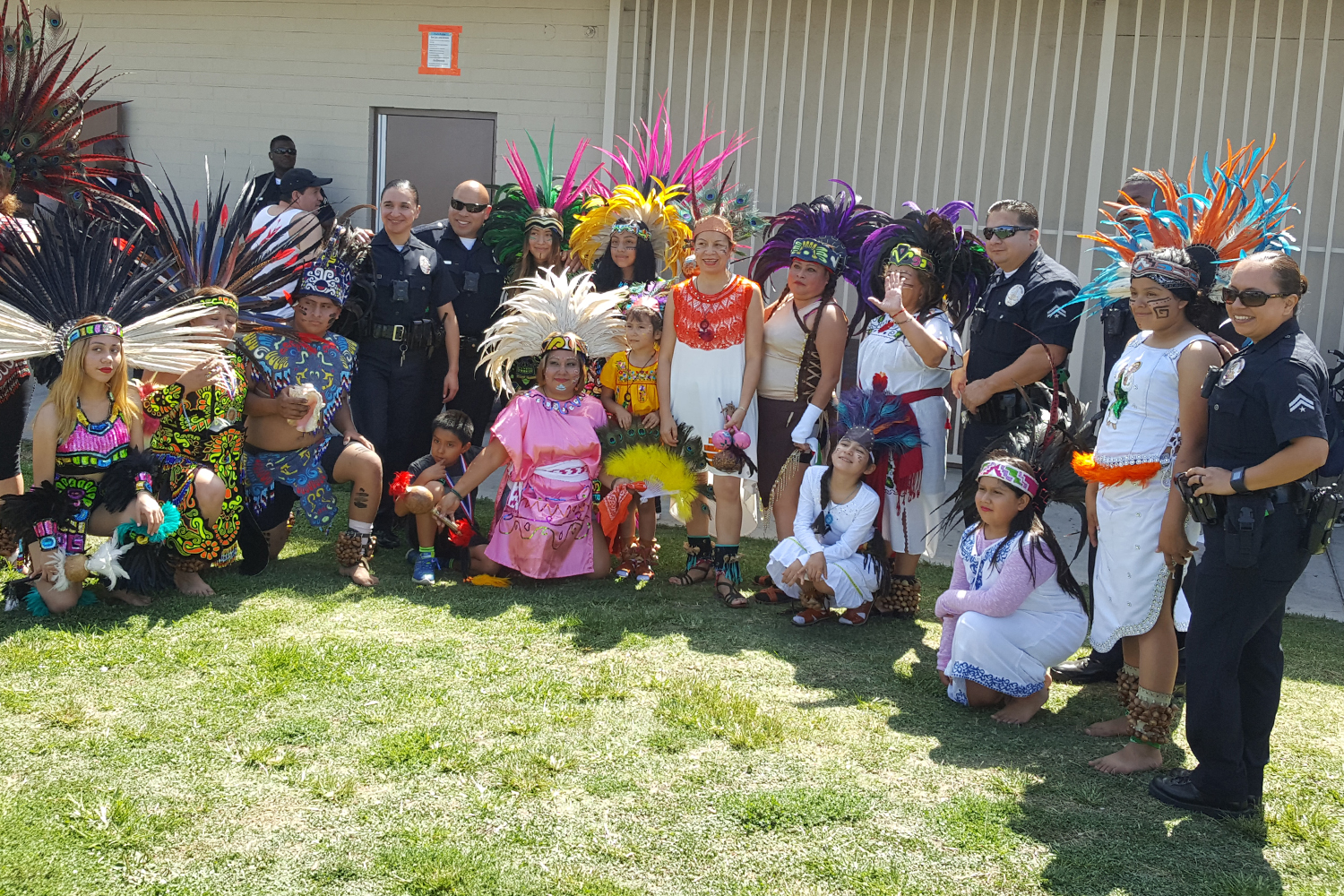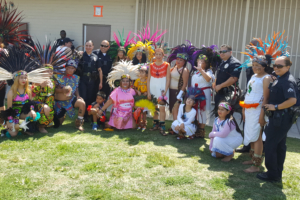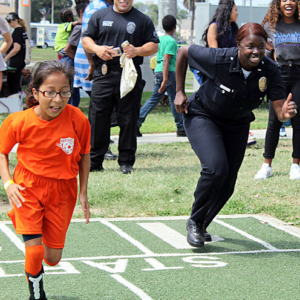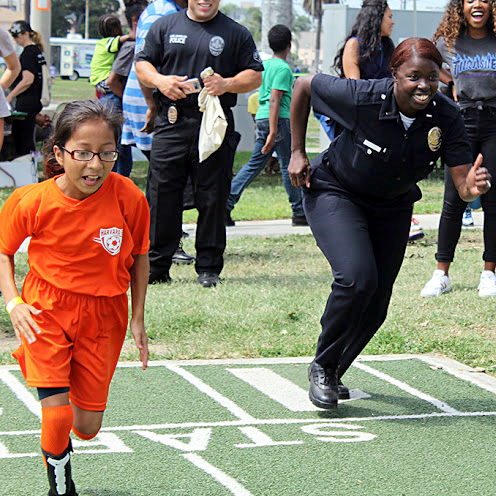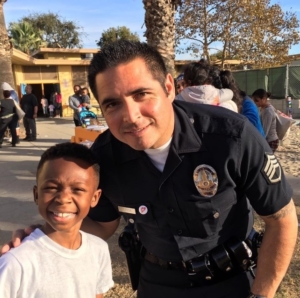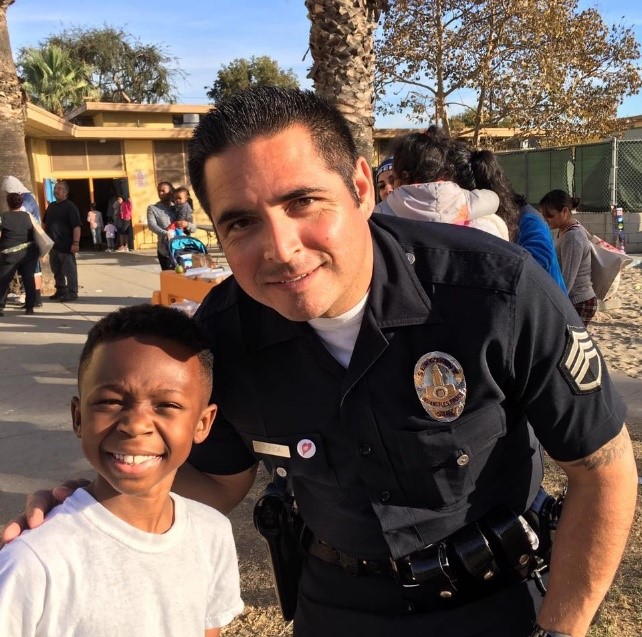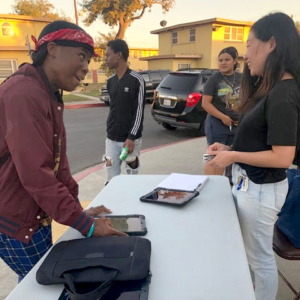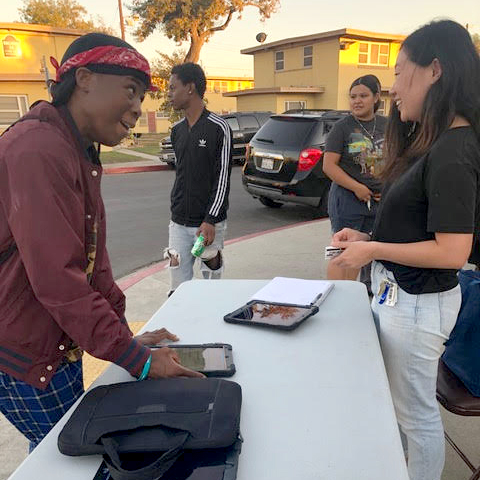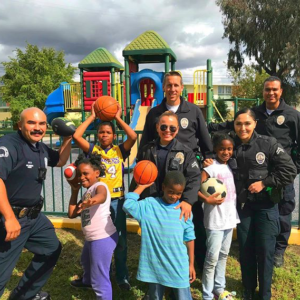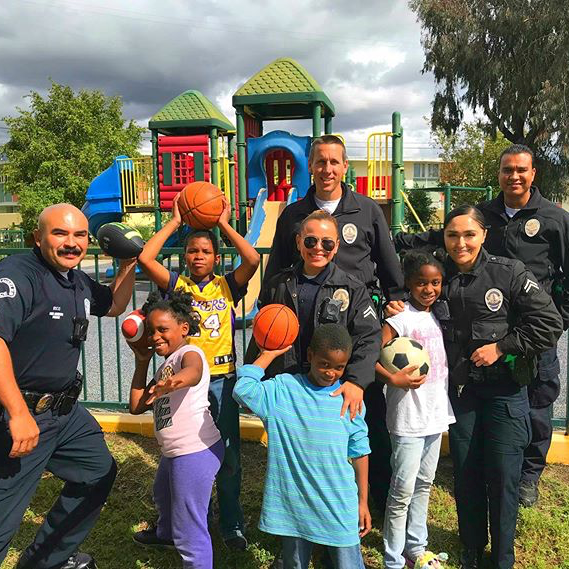UCLA Study Finds Strong Support for LAPD’s Community Policing Program Researchers say crime declines and trust increases when officers work alongside residents to build relationships
By Les Dunseith
Families living in public housing developments with a history of gang violence and troubled relationships with law enforcement are seeing less crime and feeling safer because of a policing program launched in 2011 by the Los Angeles Police Department, according to a comprehensive analysis led by Jorja Leap, an adjunct professor of social welfare at the UCLA Luskin School of Public Affairs.
The Community Safety Partnership, or CSP, began in the Jordan Downs public housing development and later expanded to two other Watts locations, Nickerson Gardens and Imperial Courts, as well as Ramona Gardens in Boyle Heights. The program assigns specially trained LAPD officers to work alongside residents to reduce crime by developing youth outreach, sports, recreational and other programs tailored specifically to their communities.
The yearlong UCLA-led evaluation compared crime rates in Jordan Downs and Nickerson Gardens with computer-generated, synthetic models of demographically similar neighborhoods that did not receive CSP services. The research team also conducted community-based research with officers and residents, logging 425 hours of observation, conducting 110 interviews and 28 focus groups, and completing close to 800 surveys as part of a mixed-methods research effort at Nickerson Gardens and Ramona Gardens. Clear majorities at both sites expressed support for this innovative program.
“Their lives were literally changed by CSP,” Leap said during a May 12 online meeting of the Los Angeles Police Commission at which the study was publicly unveiled.
Leap is an expert on gangs whose academic research and community engagement in Watts spans four decades, including the Watts Leadership Institute, a 10-year initiative based at UCLA Luskin. She told the five members of the civilian commission that people interviewed by the UCLA team “felt it was safer to go outside, mingle with people, use green spaces.”
As part of the LAPD program, extra effort is made to bridge communication between officers and residents, many of whom have deep-seated distrust of the police. Leap said a critical component involves officers apologizing to community residents for past mistakes and incidents of brutality.
“We were the enemy — pure and simple — if you had the LAPD uniform on, it was as if you had a target on your back. If there were reports of a shooting, officers were not supposed to come in without back-up,” said one officer interviewed for the report. “That’s all changed. The residents of this community want CSP here, they want this community to be safe. They welcome us.”
The impact on crime is significant. According to the analysis, in a one-year period, CSP has led to seven fewer homicides, 93 fewer aggravated assaults and 122 fewer robberies than would otherwise have been expected at Jordan Downs and Nickerson Gardens.
Statistics like those, plus the high level of resident support found by researchers, encouraged Leap to recommend to the commission that CSP serve as a model for department-wide LAPD policing efforts. The relationship-based focus could also be helpful in other crisis situations, including public health problems such as opioid abuse or the current coronavirus pandemic, she said.
“It could be extremely useful for epidemic crises, including homelessness and the pandemic,” Leap told the commission. “This is the type of approach that represents a new and important paradigm in law enforcement.”
The program has already expanded beyond Watts and Boyle Heights to housing developments in South Park and San Fernando Gardens, as well as the neighborhood surrounding Harvard Park. That expansion was funded by the Ballmer Group, co-founded by Clippers owner Steve Ballmer, and the Weingart Foundation, which, along with The California Endowment and several private donors, were among the seven funders of the $500,000 UCLA study.
The report describes many positive outcomes related to CSP, but it also identified several shortcomings.
“It is not all sunshine and roses,” Leap warned the commission, adding that the community was skeptical regarding the department’s commitment. “This must become part of the DNA of the LAPD and not a hit-and-run program that is gone in a few months.”
Some respondents questioned the level of community involvement in CSP activities, for example, saying that the officers implemented some programs without first seeking resident participation. Many residents — and even some of the officers — also expressed confusion about the specifics of the program.
“Everyone understood it was about relationships. Pretty much everyone understood it was about building trust,” Leap said. “Nevertheless, there was tremendous confusion” about the CSP model and a strong desire from all parties for better documentation of the program’s components.
Leap said the level of support for CSP in the study differed according to demographic characteristics.
Overall, she said, women were the leaders in both of the housing developments that were studied, and women were slightly more supportive of CSP than men. On the other hand, she noted, there were major differences in terms of ethnicity.
Latino residents predominantly supported CSP, Leap said. “Where we got push-back and mixed results,” particularly on community surveys, was among African Americans. The researchers were able to delve into the underlying reasons for this response during their interviews and focus groups.
“It should come as no surprise — African Americans have had the most tumultuous history” with law enforcement in Los Angeles, said Leap, who noted that incidents of police violence against blacks in other parts of the country in recent years have only added to longstanding tensions between the community and the LAPD. “There are many individuals who carry this history and this mistrust.”
In the report, one interviewee said: “Don’t say everyone loves CSP because not everyone loves CSP. There’s some people who think it’s a bunch of bull. There’s some people who are never gonna trust the police. And there’s some people who are waiting to be convinced. They’re waiting to see if the CSP sticks around or — if once all the publicity goes away — then [the CSP officers] go away.”
That concern was echoed in the report, which included a recommendation to increase funding for CSP and a designation of the program as a permanent part of the LAPD’s law enforcement strategy.
Staying the course over time is important to Leap. She pledged that this study will be just one part of an ongoing effort by her research team, which included UCLA Luskin social welfare professor Todd Franke, a methodological and systems expert, and UCLA anthropology professor P. Jeffrey Brantingham, who is a lead researcher for the Los Angeles Mayor’s Office Gang Reduction and Youth Development program. Also on the research team were UCLA research associate Susana Bonis and UCLA Luskin alumna Karrah Lompa, who served as the project manager. Several students, some of whom grew up in Watts and Boyle Heights, joined project staff in conducting field research and data analysis. A multicultural advisory board helped guide the study and will contribute to follow-up efforts.
The key to the program’s success is cooperation. Leap told the commissioners something she has repeated in public meetings: “The community truly partners with the police — this is not rhetoric but a meaningful model.”
